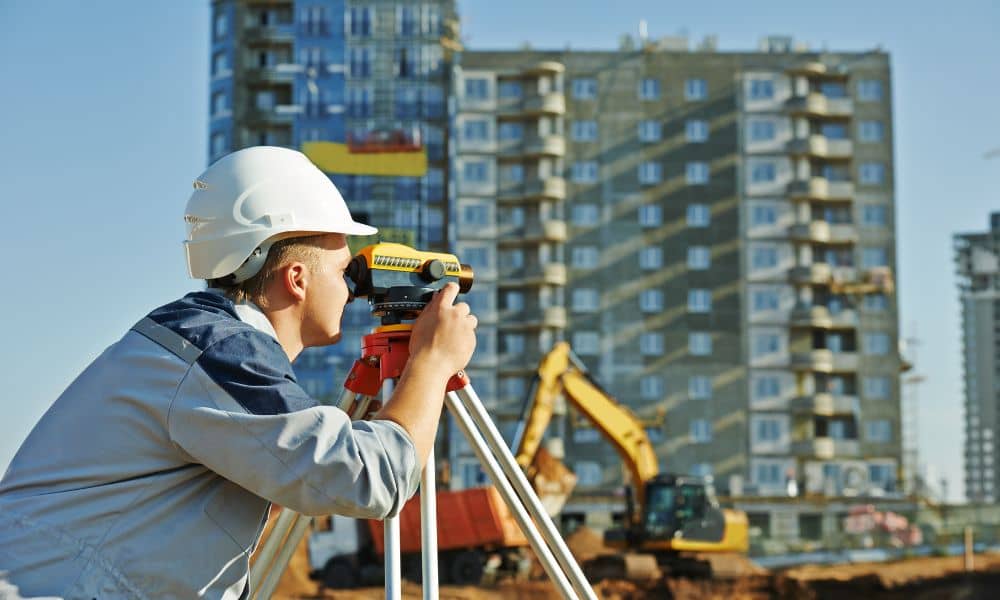
Flooding is not just a problem in coastal areas. Cities like Chicago deal with heavy rains, overflowing rivers, and drainage issues that can damage commercial buildings. For business owners, this raises a big question: how will flooding risks affect insurance costs? The answer often starts with elevation surveys. These surveys give insurance companies the facts they need about a property’s flood risk. If you own or plan to buy a commercial building ,learning how elevation surveys affect insurance can save you money and protect your investment.
What Are Elevation Surveys?
An elevation survey shows how high a building sits compared to the Base Flood Elevation (BFE) set by FEMA and local flood managers. In simple terms, it measures if your property is above or below the expected flood level.
Unlike a boundary or topographic survey, elevation surveys focus only on flood risk. This makes them important for both insurers and city officials. In Chicago, properties near the Chicago River, Des Plaines River, or older neighborhoods with weak stormwater systems often need these surveys to prove their safety.
Why Elevation Surveys Matter for Commercial Insurance
Insurance companies look at risk first. If they believe a property is at high risk of flooding, premiums go up. If the property is proven safe, costs go down. Elevation surveys provide the proof.
For example, a warehouse in South Chicago that sits above the BFE can use an elevation survey to show insurers it is safe. This can lower its insurance premiums. On the other hand, a strip mall in Cicero that sits below the flood line may pay more for coverage. Without an elevation survey, insurers may assume the worst and charge higher rates.
Key Benefits for Insurance
Getting an accurate elevation survey brings several benefits for commercial property owners:
- Lower premiums – Buildings above the flood level usually qualify for cheaper insurance.
- Correct coverage – Insurers use surveys to match coverage to the real risk.
- Compliance – Elevation surveys prove a property meets NFIP and local flood rules.
- Better trust – Insurers see surveys as proof that owners take risk management seriously.
Commercial Lots and Elevation Surveys

Commercial properties are more complex than single homes. They often include parking areas, utility systems, and loading docks. Each of these can add to flood risk.
Think of a hotel in Rosemont with an underground garage. The main building might be above flood level, but the garage may not. An elevation survey shows these details.
In suburbs like Naperville or Schaumburg, large shopping centers may sit on several lots with different elevations. Without a survey, owners risk paying for insurance based on the lowest point, even if most of the property is safe.
Common Mistakes Businesses Make
Some business owners skip elevation surveys altogether, only to regret it later. Others depend on outdated FEMA maps without checking if their property should also have a floodplain survey to confirm current risk. Another common mistake is ignoring the need for a new survey after major renovations. These gaps often lead to higher insurance costs or, worse, claim denials after a flood.
The truth is simple: commercial insurance almost always costs more without proper data. And while an elevation survey does require an upfront investment, it often pays for itself through reduced premiums and fewer compliance issues.
When to Get an Elevation Survey
Timing matters as much as accuracy. In most cases, it makes sense to order an elevation survey before buying a commercial property. Having the results upfront helps you avoid surprise insurance costs later and gives lenders the clear information they usually ask for.
Surveys also come into play during refinancing or when applying for a business loan, since insurers and banks both want proof that the building can be covered. They’re just as useful after big site changes. Expanding a warehouse, adding new pavement, or adjusting drainage can all affect how water moves across the lot.
In Chicago, where FEMA and the city occasionally update flood maps, ordering a fresh elevation survey can confirm that your property still meets compliance rules and that your insurance coverage reflects the current risk.
Using Elevation Surveys for Risk Management
Insurance is only one part of the story. Elevation surveys also help with long-term planning. They give business owners a clear picture of site risks, guide better drainage designs, and support smarter investment decisions.
For landlords, an elevation survey can even improve leasing. Tenants in areas like Lincoln Park or Oak Brook feel safer when the property comes with proof of low flood risk. Investors also see these surveys as a sign that the property is managed responsibly.
Conclusion
Commercial insurance premiums can feel unpredictable. But with elevation surveys, business owners gain clarity. These surveys show insurers exactly how much flood risk applies to a property. In Chicago and beyond, they often mean lower premiums, stronger policies, and better compliance with regulations.
If you own or plan to buy a commercial property, don’t wait until the next storm to learn your risk. Work with a licensed land surveyor, get accurate data, and use elevation surveys as a tool to protect both your property and your bottom line.